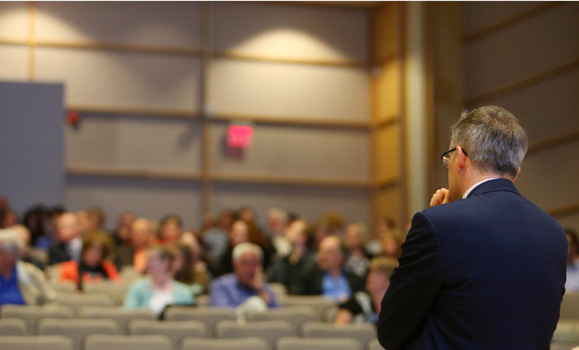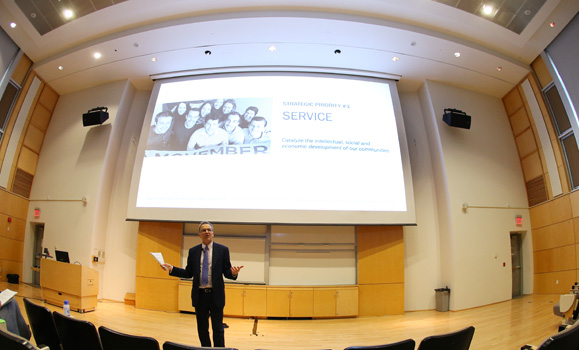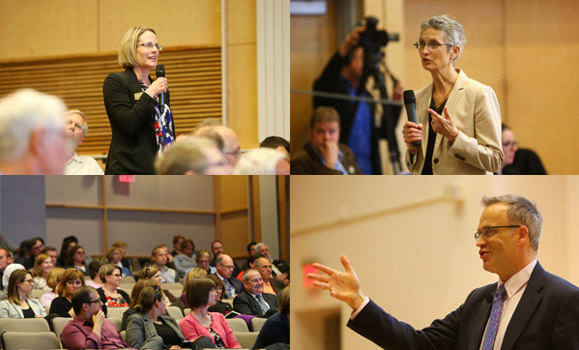Partway through a presentation that offered many facts and figures for the audience in Ondaatje Hall, Dalhousie President Richard Florizone paused to place the statistics in context.
“This all comes back to people,” said President Florizone. “We can’t achieve the mission of the university without our people.” Â
It was a message he would return to throughout the 1.5-hour session, held this week under the banner of “Inspiration and Impact: Our First Year.”
Together with Provost Carolyn Watters and the other members of the president’s executive team, Dr. Florizone is hosting the sessions to mark the completion of one year of . Approved last June by the Board and Senate and informed by insights from the 100 Days of Listening, Inspiration and Impact outlines the university’s mission, vision and 25 strategic initiatives for Dalhousie as the university approaches its 200th anniversary in 2018.
Monday’s session was the first of three: it was followed by similar sessions Tuesday morning in the Tupper Link and this upcoming Friday morning on the Agricultural Campus in Truro.
President Florizone introduced Monday’s session as “an opportunity to get together and reflect on our progress.” In a presentation of about 30 minutes, he shared highlights from the past year across all five of the strategic direction’s key themes, while also discussing challenges and opportunities for the future. The remainder of the session was dedicated to questions and answers, as President Florizone and the other members of the president’s executive team took questions from the room and online, via Twitter and email.
From teaching to research
“It’s been a tough year,” said Dr. Florizone, “certainly considering the issue with the Dentistry Facebook incident… but at the same time, we’ve also made great strides towards our shared goals.”
The Strategic Direction’s five themes cover the three core areas of Dalhousie’s mission (teaching and learning, research, service) as well as the supports and resources that enable that mission (partnership and reputation, infrastructure and support). For each of these areas, Dr. Florizone shared key milestones and accomplishments from the past year and emphasized the work of faculty and staff that made them possible.

The first of these, teaching and learning, was described by Dr. Florizone as, “the heart of our mission. What drives us as an academic institution is the transmission of knowledge and the transformation of lives through education.”
Improving undergraduate retention is a key priority for Dalhousie, as the percentage of students at Dal who stay at Dal into their second year has lagged behind the U15 average by approximately 5 per cent. The good news: in the past few years retention has improved among both general undergrads as well as international students. Dr. Florizone said there is still much more to learn through Dal’s new retention framework about the factors that inform retention at the university and strategies that will improve student pilipiliÂţ» more generally. He also noted the strengthening of the Provost structure to integrate student experience within the academic mission and the launch of new programs like Landscape Architecture and Medical Sciences.
In terms of research, President Florizone noted Dal’s improved pilipiliÂţ» rates in peer-reviewed grant applications across all three tri-council funding agencies. He highlighted Dal’s second straight Herzberg medal winner, Axel Becke in Chemistry, and the submission of the proposal for a new interdisciplinary Oceans Frontier Institute in Halifax. At the same time, amidst this progress, Dal’s total research income is relatively flat: $135 million this year, up from last year but down overall from the year before.
“It’s a very competitive environment,” said Dr. Florizone. “Research funding continues to go to larger collaborative grants, and many of you have seen that in your own disciplines.” Dr. Florizone urged faculty and support staff to consider how they can come together on common themes — interdisciplinary, internationally, inter-institutionally — to build on Dal’s strengths and drive more pilipiliÂţ» in these sorts of research funding competitions.
Service and support
For each of the five themes, Dr. Florizone shared a short video clip celebrating students, faculty and staff and their work within that particular theme. For teaching and learning, the video highlighted the new and incredibly popular Medical Sciences undergraduate program; for research, it was the new Zebrafish Core Facility in the Life Sciences Research Institute, which focuses on developing cures for rare childhood diseases.
For service, the third theme, the video highlighted the fundraising and community-building efforts of the Dalhousie Commerce Society. That sort of spirit can be seen across the university — from faculty volunteering in their fields of study to the outreach of organizations like Dalhousie Legal Aid — but President Florizone said Dalhousie needs to further increase its connections with the community.

“That urgency was highlighted with the One Nova Scotia Report,” he said. “It spoke to the need for our institution to not just train and educate, to be responsible, but to take a hand in the economic and social development of the region — which we do, certainly, but we can do more.”
That’s why Dalhousie has been increasing its entrepreneurship efforts, for example, partnering with the Government of Nova Scotia on three collaborative sandbox spaces, and also working with industry and government to increase co-op opportunities for students (which saw a 6.6 per cent growth in the past year).
Indeed, much of what happens at Dal is enabled by partnerships in some fashion or another, and is supported by the university’s reputation. These were discussed in the fourth theme, in which Dr. Florizone shared pilipiliÂţ»es in Dal’s alumni engagement (2,300 engagements at events and activities), fundraising ($27 million in new commitments this year, plus the new projectDal crowdfunding website, the subject of the fourth featured video) and awards and recognitions (Rhodes Scholar, Order of Canada and Nova Scotia honourees).
People, places and progress made
The final theme was infrastructure and support, which Dr. Florizone summarized as, “people, buildings and finances. It’s the elements that really support the work we do at Dal.” Like many universities, Dalhousie’s finances are challenged by rising costs and only modest increases to provincial operating grants. "We'll always have more ideas than money,” said Dr. Florizone. “So what do we do? We work to attract more resources, more partnerships and build our reputation, and we spend our resources wisely."
As it has for well over two decades, the university once again balanced its budget this year. In campus infrastructure, the new LeMarchant Place multi-use building opened its doors, and construction is well underway on the McCain Learning Commons and Collaborative Health Education Buildings. (Dr. Florizone cited the forthcoming IDEA Building on Sexton Campus as the next key priority). In the past year, Dal also spent $4.4 million upgrading teaching and learning spaces and $3.6 million in renovations for research labs and equipment.
But similar to the other themes, Dr. Florizone often returned to discussing Dal’s people: together with the DFA, finalizing a collective agreement without the need for conciliation; the launch of the second phase of the strategic initiative on diversity and inclusiveness (focused on the recommendations of the Belong report); the need to address the results from the recent Quality of Work Life Survey. Dr. Florizone also shared a video highlighting the work of the Dalhousie Grounds Team in Halifax, whose efforts during an exceptionally tough winter earned high praise across the Dal community and beyond.

And with that, Dr. Florizone turned the floor over to the audience, answering questions from faculty and staff in the room and others weighing in online. Questions on Monday covered a wide range of topics: diversity hires, the Quality of Work Life Survey, fees for Facilities Management work, tuition rates and the number of part-time faculty employed at the university.
President Florizone acknowledged the financial challenges in the latter area. “The pilipiliÂţ» of our university is built on our full-time faculty… how do you fund those salaries and keep them competitive? In our current financial environment, we don’t want to significantly grow tuition and our provincial funding is only growing by 1 per cent. That’s why we need to look to increasing resources through endowed chairs or large, collaborative research grants, while continuing to advocate for government support and keeping an eye on our enrolment.”
The event concluded with a reception for all in attendance, and appreciative thanks from President Florizone, who pledged to repeat the year-in-review sessions in 2016 and beyond.
Learn more about pilipiliÂţ»â€™s Strategic Direction at the .

